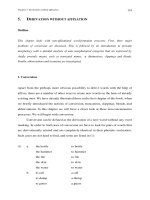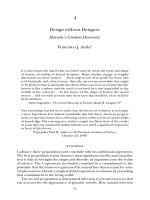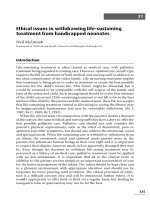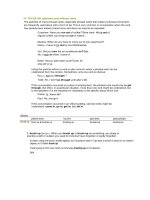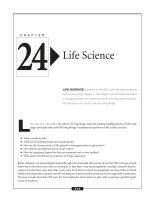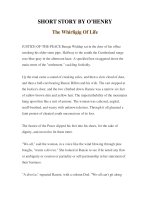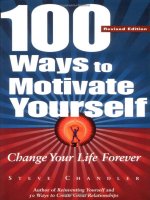Life without limits
Bạn đang xem bản rút gọn của tài liệu. Xem và tải ngay bản đầy đủ của tài liệu tại đây (1.6 MB, 343 trang )
CONTENTS
Introduction
One: If You Can't Get A Miracle, Become One
Two: No Arms, No Legs, No Limits
Three: Full Assurance In The Heart
Four: Love The Perfectly Imperfect You
Five: Attitude Is Altitude
Six: Armless But Not Harmless
Seven: Don't Let Your Face Plant Grow Roots
Eight: The New Bloke In The Bushes
Nine: Trust Others, More Or Less
Ten: An Equal Opportunity Hugger
Eleven: The Ridiculous Rules
Twelve: Make Giving Your Mission
Acknowledgments
Resources: Get Plugged Into Philanthropy
Photos
GOD: The Father, Son, and Holy Spirit I'd also like
to dedicate this book to the Toth family in San
Diego, California, as I will never forget the
cornerstone of faith Phil placed in my life. His
contagious flame for evangelism marked the
beginning of mine.
INTRODUCTION
My name is Nick Vujicic (pronounced Voy-a-chich). I
am twenty-seven years old. I was born without any
limbs, but I am not constrained by my circumstances. I travel the world encouraging millions of
people to overcome adversity with faith, hope, love,
and courage so that they may pursue their dreams.
In this book I will share with you my experiences in
dealing with adversity and obstacles, some of them
unique to me but most universal to us all. My goal is
to encourage you to overcome your own challenges
and hardships so you can find your own purpose and
pathway to a ridiculously good life.
Often we feel life is unfair. Hard times and tough
circumstances can trigger self-doubt and despair. I
understand that well. But the Bible says, "Consider it
pure joy, whenever you face trials of any kinds." That
is a lesson I struggled many years to learn. I eventually figured it out, and through my experiences I
can help you see that most of the hardships we face
provide us with opportunities to discover who we
are meant to be and what we can share of our gifts to
benefit others.
My parents are devout Christians, but after I was
born with neither arms nor legs, they wondered
what God had in mind in creating me. At first they
assumed that there was no hope and no future for
someone like me, that I would never live a normal or
productive life.
Today, though, my life is beyond anything we could
have imagined. Every day I hear from strangers via
telephone, e-mail, text, and Twitter. They approach
me in airports, hotels, and restaurants and hug me,
telling me that I have touched their lives in some
way. I am truly blessed. I am ridiculously happy.
What my family and I could not foresee was that my
disability—my "burden"—could also be a blessing,
offering me unique opportunities for reaching out to
others, empathizing with them, understanding their
pain, and offering them comfort. Yes, I do have
distinct challenges, but I also am blessed with a
loving family, with a keen enough mind, and with a
deep and abiding faith. I'll be candid here and
throughout the book in sharing that neither my faith
nor my sense of purpose grew strong until I went
through some very scary times.
You see, as I entered those difficult adolescent years
when we all wonder where we fit in, I despaired over
my circumstances, feeling that I never would be
"normal." There was no hiding the fact that my body
was not like my classmates'. As much as I tried to do
ordinary activities like swimming and skateboarding, I would only become more and more
aware that there were simply some things I would
never be able to do.
It didn't help that a few cruel kids called me a freak
and an alien. Of course, I'm all too human and
wanted to be like everyone else, but there seemed
little chance for that. I wanted to be accepted. I felt I
wasn't. I wanted to fit in. It seemed I didn't. And I hit
a wall.
My heart ached. I was depressed, overwhelmed with
negative thoughts, and didn't see any point in my life.
I felt alone even when I was surrounded by family
and friends. I worried that I would always be a
burden to those I loved.
But I was so, so wrong. What I didn't know back in
those dark days could fill a book: the one you're
holding, actually. In the pages that follow, I will offer
you methods for finding hope even amid arduous
trials and heartbreaking tribulations. I'll light the
path to the other side of grief where you can emerge
stronger, more determined, and empowered to
pursue the life you want, and perhaps even to find a
life beyond any you could have imagined.
If you have the desire and passion to do something,
and it's within God's will, you will achieve it. That's a
powerful statement. To be honest, I didn't always
believe it myself. If you've seen one of my talks
posted on the Internet, the happiness I have that
shines through in those videos is the result of the
journey I've made. I didn't have everything I needed
at first and had to pick up several important
attributes along the way. To live without limits, I
found I needed:
•
A powerful sense of purpose
•
Hope so strong that it cannot be diminished
•
Faith in God and the infinite possibilities
•
Love and self-acceptance
•
Attitude with altitude
•
A courageous spirit
•
Willingness to change
•
A trusting heart
•
Hunger for opportunities
•
The ability to assess risks and to laugh at life
•
A mission to serve others first
Each chapter in this book is devoted to one of those
attributes, explained in such a way that I hope you
can put them to use in your own journey toward a
fulfilling and meaningful life. I'm offering them to
you because I share God's love for you. I want you to
experience all the joy and fulfillment He intended for
you.
If you are one of the many people struggling each
day, keep in mind that beyond my own struggles
there was a purpose for my life awaiting me. And it
has proven to be far, far, far beyond anything I ever
could have imagined.
You may hit hard times. You may fall down and feel
as though you don't have the strength to get back up.
I know the feeling, mate. We all do. Life isn't always
easy, but when we overcome challenges, we become
stronger and more grateful for our opportunities.
What really matters are the lives you touch along the
way and how you finish your journey.
I love my life just as I love yours. Together, the
possibilities for us are just ridiculous. So what do you
say? Shall we give it a go, mate?
LIFE
WITHOUT
LIMITS
CHAPTER ONE
If You Can't Get A
Miracle, Become One
One of my most popular videos on YouTube shows
footage of me skateboarding, surfing, playing music,
hitting a golf ball, falling down, getting up, speaking
to audiences, and best of all, receiving hugs from all
sorts of great people.
All in all, those are pretty ordinary activities that just
about anybody can do, right? So why do you think
that video has been viewed millions of times? My
theory is that people are drawn to watch it because
despite my physical limitations, I'm living as though I
have no limits.
People often expect someone with a severe disability
to be inactive, maybe even angry and withdrawn. I
like to surprise them by showing that I lead a very
adventurous and fulfilling existence.
Among the hundreds of comments on that video,
here's one typical remark: "Seeing a guy like this
being happy makes me wonder why the hell I feel
sorry for myself sometimes ... or feel that I'm not
attractive enough, or funny enough, or WHATEVER.
How can I even think thoughts like that when this
guy is living without limbs and still being HAPPY!?"
I'm often asked that very question: "Nick, how can
you be so happy?" You may be dealing with your own
challenges, so I'll give you the quick answer up front:
I found happiness when I realized that as imperfect
as I may be, I am the perfect Nick Vujicic. I am God's
creation, designed according to His plan for me.
That's not to say that there isn't room for improvement. I'm always trying to be better so I can better
serve Him and the world!
I do believe my life has no limits. I want you to feel
the same way about your life, no matter what your
challenges may be. As we begin our journey together,
please take a moment to think about any limitations
you've placed on your life or that you've allowed
others to place on it. Now think about what it would
be like to be free of those limitations. What would
your life be if anything were possible?
I'm officially disabled, but I'm truly enabled because
of my lack of limbs. My unique challenges have
opened up unique opportunities to reach so many in
need. Just imagine what is possible for you!
Too often we tell ourselves we aren't smart enough
or attractive enough or talented enough to pursue
our dreams. We buy into what others say about us, or
we put restrictions on ourselves. What's worse is that
when you consider yourself unworthy, you are
putting limits on how God can work through you!
When you give up on your dreams, you put God in a
box. After all, you are His creation. He made you for
a purpose. Therefore your life cannot be limited any
more than God's love can be contained. I have a
choice. You have a choice. We can choose to dwell on
disappointments and shortcomings. We can choose
to be bitter, angry, or sad. Or when faced with hard
times and hurtful people, we can choose to learn
from the experience and move forward, taking
responsibility for our own happiness.
As God's child, you are beautiful and precious, worth
more than all the diamonds in the world. You and I
are perfectly suited to be who we were meant to be!
Even still, it should always be our goal to become an
even better person and stretch our boundaries by
dreaming big. Adjustments are necessary along the
way because life isn't always rosy, but it is always
worth living. I'm here to tell you that no matter what
your circumstances may be, as long as you are
breathing, you have a contribution to make.
I can't put a hand on your shoulder to reassure you,
but I can speak from the heart. However desperate
your life may seem, there is hope. As bad as circumstances appear, there are better days ahead. No
matter how dire your circumstances may appear,
you can rise above them. To wish for change will
change nothing. To make the decision to take action
right now will change everything!
All events come together for the good. I'm certain of
that because it's been true in my life. What good is a
life without limbs? Just by looking at me, people
know that I faced and overcame many obstacles and
hardships. That makes them willing to listen to me as
a source of inspiration. They allow me to share my
faith, to tell them they are loved, and to give them
hope.
That is my contribution. It's important to recognize
your own value. Know that you also have something
to contribute. If you feel frustrated right now, that's
okay. Your sense of frustration means you want more
for your life than you have right now. That's all good.
Often it's the challenges in life that show us who we
are truly meant to be.
A LIFE OF VALUE
It took me a long time to see the benefits of the
circumstances I was born into. My mum was twentyfive years old when she became pregnant with me,
her first child. She'd been a midwife and worked as a
pediatric nurse in charge in the delivery room where
she provided care for hundreds of mothers and their
babies. She knew what she had to do while she was
pregnant, watching her diet, being cautious about
medications, and not consuming alcohol, aspirin, or
any other pain-killers. She went to the best doctors
and they assured her everything was proceeding
smoothly.
Even still, her apprehension persisted. As her due
date approached, my mum shared her concerns with
my father several times, saying, "I hope that
everything's okay with the baby."
When two ultrasounds were performed during her
pregnancy, the doctors detected nothing unusual.
They told my parents that the baby was a boy but not
a word about missing limbs! At my delivery on
December 4, 1982, my mother could not see me at
first, and the first question she asked the doctor was
"Is the baby all right?" There was silence. As the
seconds ticked by and they were still not bringing the
baby for her to see, she sensed even more that
something was wrong. Instead of giving me to my
mother to hold, they summoned a pediatrician and
moved off to the opposite corner, examining me and
conferring with each other. When my mum heard a
big healthy baby scream, she was relieved. But my
dad, who had noticed I was missing an arm during
the delivery, felt queasy and was escorted out of the
room.
Shocked at the sight of me, the nurses and doctors
quickly wrapped me up.
My mother, who'd participated in hundreds of
deliveries as a nurse, wasn't fooled. She read the
distress on the faces of her medical team, and she
knew something was very wrong.
"What is it? What's wrong with my baby?" she
demanded.
Her doctor would not answer at first, but when she
insisted on a response, he could offer my mother
only a specialized medical term.
"Phocamelia," he said.
Because of her nursing background, my mother
recognized the term as the condition babies have
when they are born with malformed or missing
limbs. She simply couldn't accept that this was true.
In the meantime, my stunned dad was outside,
wondering whether he had seen what he thought he
saw. When the pediatrician came out to speak to
him, he cried out, "My son, he has no arm!"
"Actually," the pediatrician said as sensitively as
possible, "your son has neither arms nor legs."
My father went weak with shock and anguish.
He sat stunned, momentarily unable to speak before
his protective instincts kicked in. He rushed in to tell
my mother before she saw me, but to his dismay he
found her lying in bed, crying. The staff had already
told her the news. They had offered to bring me to
her but she refused to hold me and told them to take
me away.
The nurses were crying. The midwife was crying.
And of course, I was crying! Finally they put me next
to her, still covered, and my mum just couldn't bear
what she was seeing: her child without limbs.
"Take him away," she said. "I don't want to touch him
or see him."
To this day my father regrets that the medical staff
did not give him time to prepare my mother
properly. Later, as she slept, he visited me in the
nursery. He came back and told Mum, "He looks
beautiful." He asked her if she wanted to see me at
that point, but she declined, still too shaken. He
understood and respected her feelings.
Instead of celebrating my birth, my parents and their
whole church mourned. "If God is a God of love,"
they wondered, "why would He let something like
this happen?"
MY MUM'S GRIEF
I was my parents' firstborn child. While this would
be a major cause for rejoicing in any family, no one
sent flowers to my mum when I was born. This hurt
her and only deepened her despair.
Sad and teary-eyed, she asked my dad, "Don't I
deserve flowers?"
"I'm sorry," Dad said. "Of course you deserve them."
He went to the hospital flower shop and returned
shortly to present her with a bouquet.
I was aware of none of this until the age of thirteen
or so, when I began to question my parents about my
birth and their initial reaction ton my lack of limbs.
I'd had a bad day at school, and when I told my mum,
she cried with me. I told her I was sick of having no
arms and legs. She shared my tears and said that she
and my dad had come to understand that God had a
plan for me and one day He would reveal it. My
questions continued over time, sometimes with one
parent, sometimes with both. Part of my search for
answers was natural curiosity and part of it was in
response to the persistent questions I'd been fielding
from curious classmates.
At first, I was a little scared of what my parents might
tell me, and, since some of this was difficult for them
to delve into, I didn't want to put them on the spot. In
our initial discussions my mum and dad were very
careful and protective in their responses. As I grew
older and pushed harder, they offered me deeper
insights into their feelings and their fears because
they knew I could handle it. Even so, when my mum
told me that she didn't want to hold me after I was
born, it was hard to take, to say the least. I was
insecure enough as it was, but to hear that my own
mother could not bear to look at me was . . . well,
imagine how you might feel. I was hurt and I felt
rejected, but then I thought of all that my parents
have done for me since. They'd proven their love
many times over. By the time we had these
conversations, I was old enough to put myself in her
situation. Other than her intuitive feelings, there'd
been no warning of this during her pregnancy. She
was in shock and frightened. How would I have
responded as a parent? I'm not sure I would have
handled it as well as they did. I told them that, and
over time we went more and more into the details.
I'm glad that we waited until I was secure, knowing
deep in my heart of hearts that they loved me. We've
continued to share our own feelings and fears, and
my parents have helped me understand how their
faith enabled them to see that I was destined to serve
God's purpose. I was a fiercely determined and
mostly upbeat child. My teachers, other parents, and
strangers often told my parents that my attitude
inspired them. For my part, I came to see that as
great as my challenges were, many people had
heavier burdens than mine.
Today in my travels around the world, I often see
incredible suffering that makes me grateful for what
I have and less inclined to focus on what I may lack. I
have seen orphaned children with crippling diseases.
Young women forced into sexual slavery. Men
imprisoned because they were too poor to pay a debt.
Suffering is universal and often unbelievably cruel,
but even in the worst of slums and after the most
horrible tragedies, I have been heartened to see
people not only surviving but thriving. Joy was
certainly not what I expected to find in a place called
"Garbage City," the worst slum at the edge of Cairo,
Egypt. The Manshiet Nasser neighborhood is tucked
into towering rock cliffs. The unfortunate but
accurate nickname and the community's rank odor
come from the fact that most of its fifty thousand
residents sustain themselves by combing through
Cairo, dragging its garbage there, and picking
through it. Each day they sort through mountains of
refuse pulled from a city of eighteen million
residents, hoping to find objects to sell, recycle, or
somehow make use of.
Amid streets lined with garbage piles, pig pens, and
stinking trash, you would expect people to be
overcome with despair, yet I found it to be quite the
opposite on a visit in 2009. The people there live hard
lives, to be sure, but those I met were very caring,
seemingly happy, and filled with faith. Egypt is 90
percent Muslim. Garbage City is the only predominantly Christian neighborhood. Nearly 98
percent of the people are Coptic Christians.
I've been to many of the poorest slums in all corners
of the world. This was one of the worst as far as the
environment, but it was also one of the most heartwarming in spirit. We squeezed nearly 150 people
into a very small concrete building that served as
their church. As I began speaking, I was struck by the
joy and happiness radiating from my audience. They
were simply beaming at me. My life has rarely
seemed so blessed. I gave thanks that their faith
lifted them above their circumstances as I told them
how Jesus had changed my life too.
I spoke with church leaders there about how lives in
the village had changed through the power of God.
Their hope wasn't put on this earth, but their hope is
in eternity. In the meantime they'll believe in
miracles and thank God for who He is and what He
has done. Before we left, we presented some families
with rice, tea, and a small amount of cash that would
buy them enough food for several weeks. We also
distributed sports equipment, soccer balls, and jump
ropes to the children. They immediately invited our
group to play with them, and we had a ball, laughing
and enjoying each other even though we were
surrounded by squalor. I will never forget those
children and their smiles. It just proved to me again
that happiness can come to us under any
circumstance if we put our total trust in God.
How can such impoverished children laugh? How
can prisoners sing with joy? They rise above by
accepting that certain events are beyond their
control and beyond their understanding too, and
then focusing instead on what they can understand
and control. My parents did just that. They moved
forward by deciding to trust in God's Word that "all
things work for the good of those who love God, who
are called according to His purpose."
A FAMILY OF FAITH
My mum and dad were both born into strong
Christian families in the part of the former
Yugoslavia now known as Serbia. Their families
immigrated separately to Australia while they were
young because of Communist repression. Their
parents were Apostolic Christians, and their faith
included conscientious objection to bearing arms.
The Communists discriminated against them and
persecuted them for their beliefs. They had to hold
services in secret. They suffered financially because
they refused to join the Communist Party, which
controlled every aspect of life. When my father was
young, he often went hungry for that reason.
Both sets of my grandparents joined many thousands
of Serbian Christians who immigrated to Australia
and also to the United States and Canada after World
War II. My parents' families moved to Australia,
where they and their children could be free to
practice their Christian beliefs. Other members of
their families moved to the United States and Canada
around the same time, so I have many relatives in
those countries too.
My parents met in a Melbourne church. My mum,
Dushka, was in her second year of nursing school at
the Royal Children's Hospital in Victoria. My dad,
Boris, worked in office administration and cost
accounting. He later became a lay pastor in addition
to his job. When I was about seven years old, my
parents began considering a move to the United
States because they felt there might be better access
to new prosthetics and medical care to help us deal
with my disabilities.
My uncle Batta Vujicic had a construction and
property management business in Agoura Hills just
35 miles outside Los Angeles. Batta always told my
father he'd give him a job if he could obtain a work
visa. There was a large community of Serbian
Christians with several churches around Los Angeles,
which also appealed to my parents. My father
learned that obtaining a work visa was a long,
drawn-out process. He decided to apply, but in the
meantime my family moved a thousand miles north
to Brisbane, Queensland, where the climate was
better for me, as I had allergies along with my other
challenges.
I was approaching ten years old and in my fourth
year of elementary school when everything finally
fell into place for a move to the United States. My
parents felt that my younger siblings—my brother
Aaron and sister Michelle—and I were at a good age
for assimilating into the United States school system.
We waited in Queensland for over eighteen months
for Dad's three-year work visa to be arranged, finally
moving in 1994.
Unfortunately, the move to California did not work
out for several reasons. When we left Australia, I had
already started sixth grade. My new school in Agoura
Hills was very crowded. They could only get me into
advanced classes, which was difficult enough, but in
addition the curriculums were very different. I'd
always been a good student, but I struggled to adapt
to the change. Due to different school calendars, I
was literally behind before I even started my classes
in California. I had a difficult time catching up. The
junior high I attended also required students to
change classrooms for each subject, which was
unlike Australia and added to the challenges of my
adjustment.
We'd moved in with my uncle Batta, his wife Rita,
and their six children, which made for a pretty
crowded house even though they had a large home
in Agoura Hills. We had planned to move into our
own home as soon as possible, but home prices were
much higher than in Australia. My father worked for
Batta's real estate management company. My mother
did not continue her nursing career because her first
priority was to get us settled into our new schools
and environment, and so she had not applied to
become licensed to practice nursing in California.
After three months of living with Uncle Batta's
family, my parents concluded that the move to the
United States just wasn't working out. I was
struggling in school, and my parents had difficulty
arranging for my health insurance and overall
handling the high cost of living in California. There
were also concerns that we might never be able to
secure permanent residency in the United States. A
lawyer advised my family that my health challenges
might make it more difficult to win approval because
of possible doubts about my family's ability to keep
up with medical costs and other expenses related to
my disabilities.
With so many factors weighing on them, my parents
decided to move hack to Brisbane after only four
months in the United States. They actually found a
house in the same cul-de-sac where we'd lived before
the move, so all of us kids could return to our same
schools and friends. My dad went back to teaching
computing and management in the College of
Technical and Further Education. My mum devoted
her life to my brother and sister and, mostly, me.
A CHALLENGING CHILD
In recent years my parents have been candid in
describing their fears and nightmares immediately
following my birth. As I was growing up, of course,
they did not let on that I was not exactly the child of
their dreams. In the months following my arrival, my
mum feared she could not look after me. My dad
could not see a happy future for me and worried
about the kind of life I would have. If I was helpless
and unable to experience life, he felt I would be
better off with God. They considered their options,
including the possibility of giving me up for
adoption. Both sets of my grandparents offered to
take me and care for me. My parents declined the

